|
|
|
Sort Order |
|
|
|
Items / Page
|
|
|
|
|
|
|
| Srl | Item |
| 1 |
ID:
163069
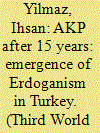

|
|
|
|
|
| Summary/Abstract |
In recent years, several observers of Turkey have recognised a novel development in Turkish politics: the rise of Erdoganism. President Recep Tayyip Erdoğan’s personality and style have come to embody the Turkish nation, the state and its economic, social and political institutions. But what is Erdoganism? What are its main attributes? Is it a mere ideology or the name of the emerging political regime in Turkey? While commentators have provided several observations of Erdoganism, it has not been duly examined on its own in the academic literature. This paper’s main premise is that in Turkey, a new political regime has emerged in recent years which can best be defined as Erdoganism. Erdoganism has four main dimensions: electoral authoritarianism as the electoral system, neopatrimonialism as the economic system, populism as the political strategy and Islamism as the political ideology. We first explain why we think Erdoganism is a better concept to define the emerging political regime in Turkey. We briefly discuss Sultanism, Khomeinism and Kemalism in order to produce a set of references for our discussion of Erdoganism. We then provide a thorough analysis, explaining the ways in which Erdoganism manifests itself through electoral authoritarianism, neopatrimonialism, populism and Islamism.
|
|
|
|
|
|
|
|
|
|
|
|
|
|
|
|
| 2 |
ID:
171944
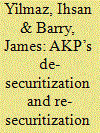

|
|
|
|
|
| Summary/Abstract |
This article evaluates the Turkish state’s relations with the Alevi community through a securitization theory framework. It first examines the issue in its historical context, comparing Kemalist and more recent policies, and highlights that despite the ideological differences between the previous governments and the current AKP government, for Alevis much has remained the same. It then turns to the securitization of the Alevis by successive regimes, and demonstrates that the period of de-securitization begun under the AKP did not end the practice, and that political expedience led to the issue’s re-securitization.
|
|
|
|
|
|
|
|
|
|
|
|
|
|
|
|
| 3 |
ID:
184173
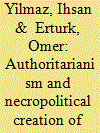

|
|
|
|
|
| Summary/Abstract |
One of the most widely used and influential ways of creating foundational myths for authoritarian legitimation is to construct a necropolitical narrative around the significance of dying for the nation, homeland, state and the leader, i.e. martyrdom. Mbembe’s concept ‘necropolitics’ (the right of the sovereign to determine who shall live and who shall die) has been expanded to include the pollical instrumentalization of martyrdom narratives. However, the literature has not analyzed the necropolitical martyr-icons. This paper aims to address this gap by looking at two historical episodes in Turkey, one in the 1930s dominated by secularists and post-2016 dominated by Islamists.
|
|
|
|
|
|
|
|
|
|
|
|
|
|
|
|
| 4 |
ID:
164572
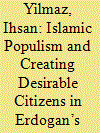

|
|
|
|
|
| Summary/Abstract |
Turkey’s Justice and Development Party (AKP) governments have managed to remove Kemalism only to replace it with an Islamist nation-building and social-engineering project that is as, if not more, authoritarian, conservative, and regressive than the Kemalist one. The Turkish education system has been transformed into a political tool to manipulate youth and mold them into cadres of a peculiar Islamist ideology supported by the Recep Tayyip Erdogan regime. This essay discusses four sets of educational tools that have been redesigned to enable Erdogan and his entourage to shape the worldview of younger generations of Turkish citizens.
|
|
|
|
|
|
|
|
|
|
|
|
|
|
|
|
| 5 |
ID:
060531
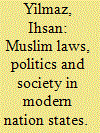

|
|
|
|
|
| Publication |
Aldershot, Ashgate, 2005.
|
| Description |
xxii, 248p.
|
| Standard Number |
0754643891
|
|
|
|
|
|
|
|
|
|
|
|
Copies: C:1/I:0,R:0,Q:0
Circulation
| Accession# | Call# | Current Location | Status | Policy | Location |
| 049497 | 340.115/YIL 049497 | Main | On Shelf | General | |
|
|
|
|
| 6 |
ID:
176233
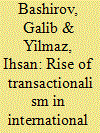

|
|
|
|
|
| Summary/Abstract |
This paper's main objective is to explain the concept of transactionalist foreign policy in detail and to demonstrate how it applies to a real-world case in Turkish foreign policy towards the EU under the AKP rule. We define transactionalism as a foreign policy approach that favours bilateral to multilateral relations, focuses on short-term wins rather than longer-term strategic foresight, adheres to a zero-sum worldview where all gains are relative and reciprocity is absent, rejects value-based policymaking, and does not follow a grand strategy. This paper also provides a new layer to the existing periodisation of AKP's EU policy through framing the EU as ‘a foreign policy actor’ in Turkey-EU relations. Scholars divide Turkey's EU policy under the AKP government into three broad periods: Europeanisation, selective Europeanisation and De-Europeanisation. We complement this literature by adding another layer of analysis that focuses on Turkey's foreign relations in its broader region, including the EU, and argue that Turkey's relations with the EU were characterised by the zero-problems doctrine during the selective Europeanisation period, and by civilisational competition with the EU during the de-Europeanisation period, and by transactionalism since 2016.
|
|
|
|
|
|
|
|
|
|
|
|
|
|
|
|
|
|
|
|
|